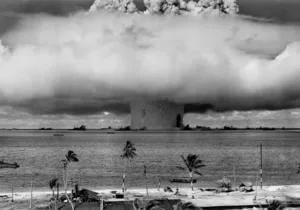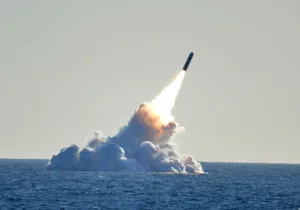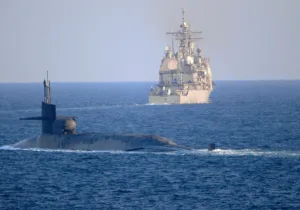Retired Rear Admiral Gene La Rocque, a Pearl Harbor hero who just died at age 98, was the controversial founder of the Center for Defense Information, a lobby against military spending often derided as the Center for Defense Disinformation. Founded in the early 1970s, it essentially advocated U.S. strategic drawdown and withdrawal during the Cold War’s final decades. In the 1980s hundreds of other generals and admirals publicly denounced La Rocque and his lobby colleague, Rear Admiral Eugene Carroll, for opposing Reagan’s military buildup and touting the Soviet-backed nuclear freeze movement.
Lamentably, La Rocque even appeared on Soviet television to denounce Reagan policies, which for many critics was unforgivable. Former Chief of Naval Operations Admiral Elmo Zumwalt bristled, “I believe that if La Rocque’s ideas prevail my children will not live out their lives in freedom.” During joint congressional testimony, Zumwalt, whom I once hosted as a speaker at my church men’s group breakfast, refused to shake his former subordinate’s hand.
As a teenager, once, I spoke with La Rocque briefly on the phone. He was cordial. Later, as a missions officer for my congregation, I discovered the United Methodist missions board, during its politically radical years, had made a grant to his group, which was infuriating. As a college student interning with a missile defense advocacy group, whose “Star Wars” idea he opposed, I heard him much reviled by the retired generals who headed my organization.
Admiral La Rocque’s work was called leftist by its critics, and certainly he was a fellow traveler of the far left. But apparently he was more by personal conviction a libertarian who ideologically opposed a large military enforcing American global hegemony or at least resistance against the Soviet Bloc, whose threat he thought exaggerated.
The Admiral was present during the Japanese attack on Pearl Harbor, and he was in combat in the Pacific for the next four years, storming islands under enemy fire. After the war, he officered a ship in the U.S. that suffered an accident killing and wounding scores of men. He rose quickly up the naval ladder but soured against the Vietnam War, making him suspect with colleagues and superiors, leading to his early retirement, and his entrance into activism. He never seems to have wavered from that political course for the rest of his very long life. He was wrong, but sincerely so.
Surely La Rocque was deeply and understandably affected by the wartime horrors he experienced. An obituary recalls he trashed some of his medals and avoided war films, so sickened by the memories. Many with similar histories became avid hawks and advocates for aggressive U.S. military actions during the Cold War. But he became a dove who perhaps idealized a pre-WWII America that was aloof from global troubles and enjoyed a seeming Arcadia of small government and low military expenditures.
Such idealizations still have understandable appeals for many who are tired of years of U.S. military engagements and commitments globally, stretching back 75 years to Pearl Harbor, where young La Rocque was a witness. Why should our nation carry the burden, they ask. Why indeed. But who else will? And what would result from a world without U.S. leadership? How safe would America be in such a world? Likely, not very.
La Rocque thought the U.S. could effectively end the Cold War by refusing to participate. He minimized or ignored the consequences of a world where the Soviet Union would have been dominant and uncontested. Fortunately, his advocacy failed. But his life and the resulting lessons are instructive. May he rest in peace and be recalled for his sacrificial service as a young man during harrowing days.







 Live in the DC area? Sign-up for Providence's in-person events list!
Live in the DC area? Sign-up for Providence's in-person events list!